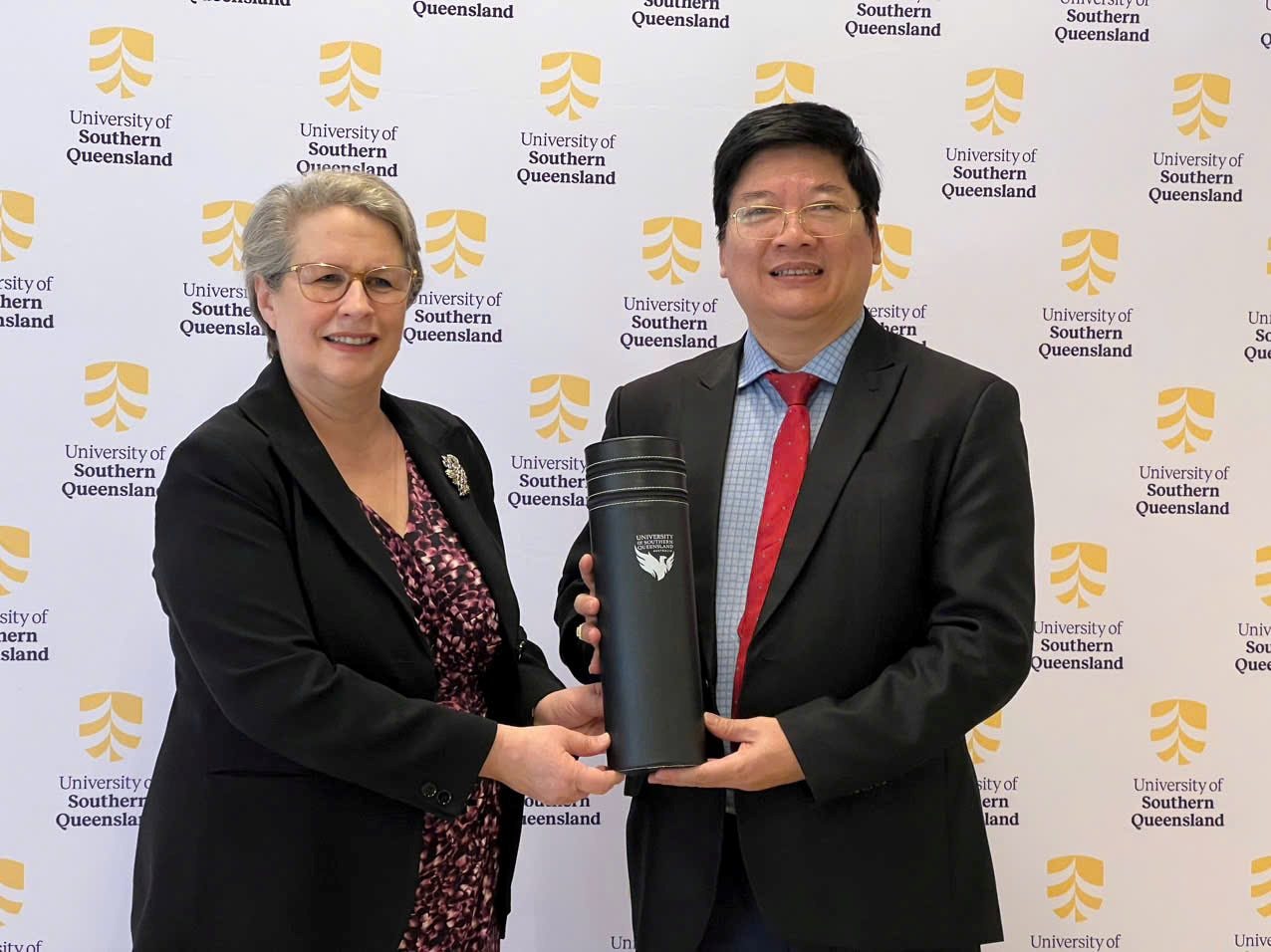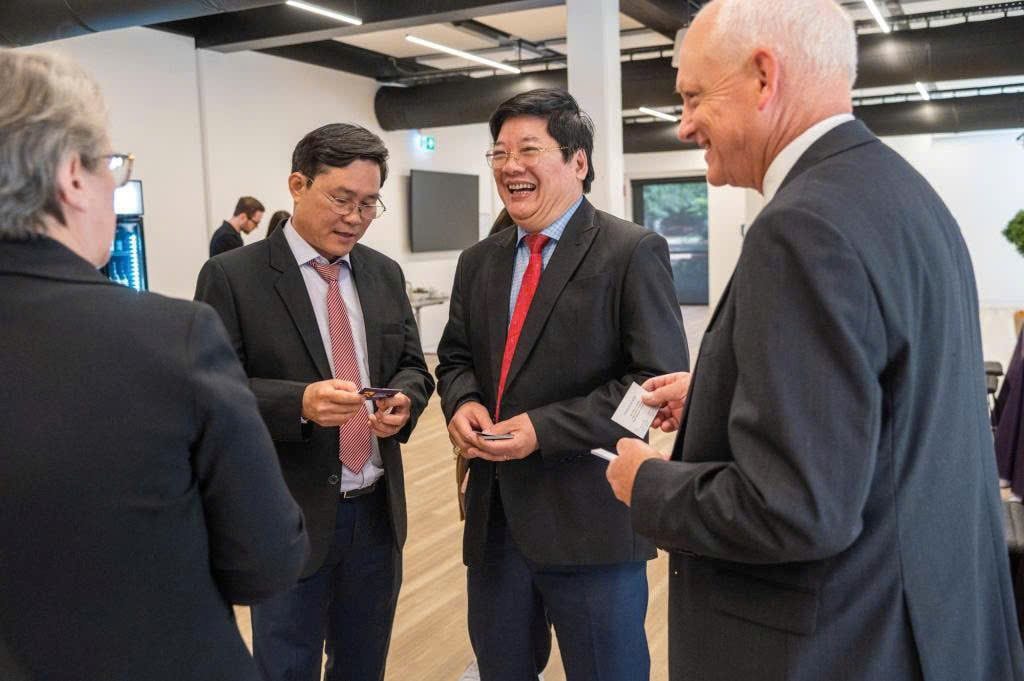.jpg)
.jpg)
1. Could you share the educational philosophy you have been implementing at Nong Lam University, Ho Chi Minh City?
Dr. Tran Dinh Ly: The educational philosophy I always pursue is that "education must be closely tied to practicality and sustainable development." This means that education should not simply stop at conveying knowledge but must inspire creative thinking, a sense of social responsibility, and the ability to apply knowledge in practice.
.jpg)
.jpg)
At Nong Lam University, this philosophy has been realized through initiatives such as curriculum innovation, promoting applied research, and establishing a strong network with businesses and social communities. We especially focus on training human resources capable of international integration and meeting the socio-economic development needs of localities and the nation.
2. As Vice Rector and Director of the Ninh Thuan Branch, what strategies have you implemented to modernize the educational system and meet the demand for human resources for sustainable social development?
Dr. Tran Dinh Ly: I have implemented several steps to modernize the educational system and meet the demand for human resources for sustainable social development.
Firstly, the training programs are designed to be closely connected with practical applications, integrating theoretical knowledge and practical skills, with particular emphasis on fields like agriculture, aquaculture, and renewable energy. We also enhance interdisciplinary factors, combining technology, economics, and environmental studies in the training programs to equip students with a comprehensive outlook and high adaptability.


The faculty members are trained professionally through workshops, international cooperation, and scientific research. At the same time, smart management technology is applied to optimize processes and ensure transparency of information.
Additionally, we strengthen partnerships with businesses and international organizations to create internship and job opportunities and apply advanced training models. The Ninh Thuan Branch continually invests in modern infrastructure, from laboratories and practical facilities to dormitories and digital teaching platforms.
Importantly, we link education with sustainable local development through smart agricultural projects, high-quality human resource training, and fostering a culture of creativity and social responsibility within the student community.
3. What results have been achieved, and what challenges have you faced in aligning education with local realities at the Ninh Thuan Branch?
Dr. Tran Dinh Ly: There have been noticeable changes and positive outcomes, such as graduates being able to meet job requirements in the locality immediately, while research and technology transfer projects have contributed to improving productivity and the quality of life for the people.
However, the biggest challenge in implementing this strategy is the disparity in resources between the training institution and local realities. This requires continuous effort to bridge the gap and create more synchronized development conditions.


4. In your opinion, what are the core factors for innovating curricula and strengthening international connections in higher education?
Dr. Tran Dinh Ly: To achieve substantial results in curriculum innovation and strengthening international connections in Vietnamese higher education, three core factors must be prioritized:
Curriculum Content: Programs must be updated to closely follow global trends and meet labor market demands.
Faculty Capacity: Faculty capacity must be enhanced through training and international exchanges, enabling the adoption of modern teaching methods.
International Partnerships: Building international collaborations with universities and organizations abroad is essential to share resources and create new learning and research opportunities for students.
5. How should the role of education in developing high-quality human resources, particularly in fields such as agriculture and the environment, be perceived?
Dr. Tran Dinh Ly: Education plays a pivotal role in building high-quality human resources. Specifically, in fields such as agriculture, forestry, and the environment, education must not only provide specialized knowledge but also inspire a sense of responsibility toward the community and the planet. This is the key to achieving sustainable development.
6. What innovations have you implemented to enhance the effectiveness of collaboration between the university and businesses?
Dr. Tran Dinh Ly: Collaboration between universities and businesses is a core factor in meeting societal needs, particularly in the context of an ever-changing labor market. As an educational administrator, I, along with my team, have implemented numerous innovations to enhance the effectiveness of this collaboration.
First, mandatory internship programs with businesses have been established to familiarize students with real-world work environments and provide businesses with early opportunities to identify and select suitable talent.
Additionally, the university organizes business forums, career seminars, and "Career Days," creating direct bridges between the university and businesses. These events not only help students with career orientation but also enable businesses to tap into the potential of the university's talent pool. Training programs are also co-designed with business participation to ensure that the curriculum aligns closely with the practical demands of the market.
Furthermore, the university develops collaborative applied research projects with businesses to address real-world challenges in production and commerce, delivering tangible value to society. The alumni network, which includes many individuals holding key positions in businesses, also serves as an important bridge for supporting training and inspiring current students.
.jpg)
.jpg)
These innovations not only improve students' employability upon graduation but also create a sustainable ecosystem where the university and businesses support each other's development.
7. In the context of globalization, what suggestions do you have to enhance the international integration capabilities of Vietnamese students, particularly in economics and engineering?
Dr. Tran Dinh Ly: To enhance the international integration capabilities of Vietnamese students, particularly in economics and engineering, four factors must be prioritized.
First, improving foreign language proficiency is essential, as English and other languages are tools that enable students to access global knowledge. Language programs should be designed to be in-depth and practical.
Second, training programs need to meet international standards by linking with prestigious foreign universities and adopting global teaching and evaluation standards.
Third, developing soft skills such as teamwork, time management, critical thinking, and creativity will help students adapt to international environments.
Lastly, increasing opportunities for international exchanges through academic exchange programs, internships abroad, and participation in international forums will broaden students' horizons and experiences.
8. As someone directly involved in research and developing the branding of Vietnamese agricultural products, how do you see the role of education and research in supporting local economies being realized?
Dr. Tran Dinh Ly: Education and research play a vital role in supporting local economies, particularly in the agricultural sector. First, systematic training enhances the quality of human resources, turning them into leaders in the production, processing, and marketing of agricultural products. Next, the application of scientific and technical research in production improves productivity, quality, and optimization of preservation processes, thereby increasing economic value.
.jpg)
.jpg)
9. How can an educational environment that encourages creativity, research, and social responsibility among students be established?
Dr. Tran Dinh Ly: The three most important factors in creating an effective higher education environment that promotes creativity, research, and social responsibility among students are:
Encouraging Creativity: Create a space for free thinking, support new ideas through competitions and real-world research projects.
Supporting Research: Provide ample resources, facilities, funding, and guidance from faculty to enable students to pursue scientific projects.
Embedding Community Projects: Integrate community-based projects into the curriculum to instill a sense of social awareness and responsibility in students from the outset of their education.
10. What goals should Vietnam's higher education system aim for in the next decade to remain competitive and ensure sustainable development?
Dr. Tran Dinh Ly: I believe Vietnam’s higher education system should focus on four key goals over the next decade to stay competitive and achieve sustainable development in a globalized context:
Internationalization: Strengthen international cooperation programs and innovate teaching methods in line with global standards.
University Autonomy: Enhance financial, organizational, and academic autonomy to improve the operational efficiency of universities.
Digital Transformation: Adopt Industry 4.0 technologies in teaching and management to meet modern demands.
Strong Linkages with Industry: Ensure training programs are closely aligned with the practical needs of businesses to guarantee high-quality graduates who are ready to meet labor market demands.
.jpg)
.jpg)
11. As an educational administrator, how do you balance your time between work, family, and personal life?
Dr. Tran Dinh Ly: To balance the busy schedule of an educational administrator with leisure activities, family care, and social engagement, I always set clear priorities for each task and use time management tools. I create detailed plans, organizing work by week and month with specific milestones. Spending time with family is one of my top priorities, which I maintain through habits such as regular conversations and shared activities. During convenient business trips, I often combine them with my spouse’s company, creating meaningful and enjoyable experiences. Finally, I maintain my health and relaxation through regular exercise and recreational activities, which help me recharge for work.
12. How is your perspective on educating and guiding your children’s career development reflected in your family life?
Dr. Tran Dinh Ly: I believe that educating and guiding children’s career paths should be based on listening and companionship. I think children should have the freedom to explore and develop according to their interests and abilities. In my family, I always encourage my children to ask questions, find solutions, and take responsibility for their decisions.
.jpg)
.jpg)
The educational principles I apply include encouraging independence, helping them solve problems on their own, and learning from failures. I respect the individuality of each child and support their personal goals without imposing my own views. Additionally, I strive to inspire them to find joy in learning and nurture a lifelong passion for discovery.